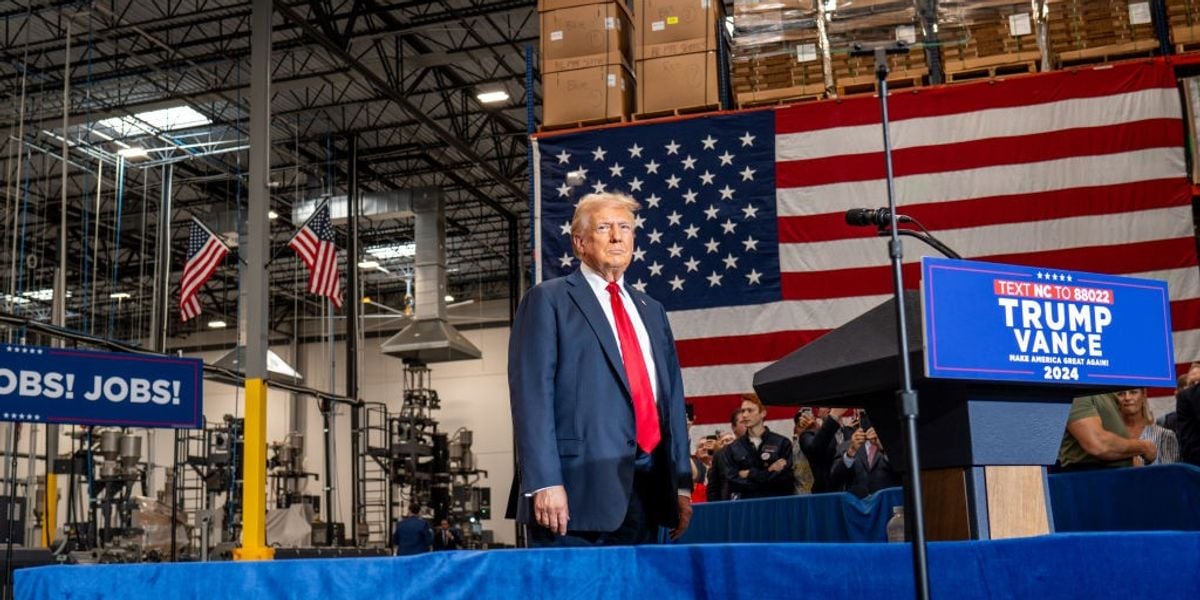One of the Biggest Losers
of Manufacturing in American Historythe Biggest loser in History
That’s fair, as Trump is friends with all the big outsourcing CEOs and banking execs.
But he wasn’t doing anything novel. It was the exact same policy enacted under Carter and Reagan and Clinton and Bush and Obama. Jobs outsourcing, automation, and financialization have been the federal policy for 50 years.
What is Harris planning to do differently? Send even more kickbacks to Big Three automakers and failing Silicon Valley firms? Shore up agribusiness by stealing more water from Mexico and subsidizing more resource ravenous cattle and pork production? Using more prison labor to supplant the aging blue collar labor force?
Because right now I’ve seen nothing out of the campaign to suggest it isn’t just a continuation of Neoliberal economics dating to the Milton Friedman era.
Trump did cripple the U.S.’s steel industry if I recall correctly. And he just wants to put more tariffs up which completely fuck over a lot of people.
So yea, the U.S. is not exactly going to be a utopia under Harris but Trump will absolutely be a nightmare for everyone.
Trump did cripple the U.S.’s steel industry if I recall correctly.
His tarrif was a huge boon for the steel industry. But because it kicked off retaliation from China, it undermined major exporters such as Boeing and Caterpillar and the soybean and pork industries.
One subsequent consequence of the tariff was a move by Nippon Steel to acquire the largest US manufacturer, US Steel. This has been held up by the Biden administration, but Republican stacked courts seem favorable to the acquisition. We’ll see how long Biden’s stalling can last.
But I’m unaware of what he may have done to cripple domestic steel production. The industry has been in the shitter for some time, largely due to how over leveraged manufacturers became during ZIRP.
That’s not a Trump problem, it’s a problem with American executives running Bust Outs on critical domestic infrastructure.
I dont know of youre purposely missing the point, but tariffs are usually met with retaliation. They reduce trade, which reduces productivity and the increase inflation.
tariffs are usually met with retaliation
I listed the instances of retaliation. But they didn’t include steel, because we import more steel than we export.
They reduce trade, which reduces productivity
Global productivity, maybe. But domestically, tariffs simply insource productivity.
For industries where savings simply come in the form of negative externalities, there’s no loss forcing production back into a more regulated environment.
That’s not what Trump was trying to do, but I note it to disabuse the notion that tariffs are universally bad.
Yes, but you seemed to only focus on the effects for the steel industry and handwaved away the loss from rrtaliation.I’m pointing out that it was overall negative.
Youre also thinking its a zero sum game. In sourcing to the domestic market because of tarrifs means less competitive pricing which reduces demand and productivity. New products are not launched due to costs being too high to do so. New factories go unbuilt.
Tariffs to build in the negative externalities, like lax labor laws or carbon cost are allowed by WTO and level the playing field making trade more predictable, not more erratic and I expect will be a big part of future global trade. Trunks tariffs were not that. I take your point though that his weren’t that. I think its worth clarifying why.
you seemed to only focus on the effects for the steel industry
Trump did cripple the U.S.’s steel industry
That’s what I’m responding to. He didn’t cripple the industry. It improved after the tariffs.
Tariffs to build in the negative externalities
They localize production.
One way overseas production can out compete domestic production is by letting the foreign market eat all the externalities to keep production costs low.
Trunks tariffs were not that.
Largely because American steel production is as messy as anywhere else.
The future of cheap efficient steel production is going to be centered around electric powered foundries. But set up costs for new foundries are high, and simply costing on existing infrastructure lets prices stay low.
Tariffs/subsidies give developing industries an opportunity to invest in higher efficiency infrastructure without being priced out of the market.
They’re not inherently bad. And people being deluded into thinking they are undermines the quality of the industry as a whole, as businesses cling to cheap outdated machinery.
I understand that, but being pedantic doesn’t make your points stronger when you handwave the negatives. You also interpret the steel industry as just steel producers but it is also the purchasers who have seen increasing costs due to tariffs.
Us steel has made a smaller portion of worldwide supply, while costing more for usa purchasers. However, even with the tariffs, some Costa are down due to less demand, from a cooling economy, which tariffs are partly to blame for.
Tariffs dont give businesses the opportunity to invest in new infrastructure. They actively make it less necessary for them to do so. They reduce the need to invest in efficiency.
https://www.barrons.com/articles/biden-trump-steel-tariffs-c44f4279


